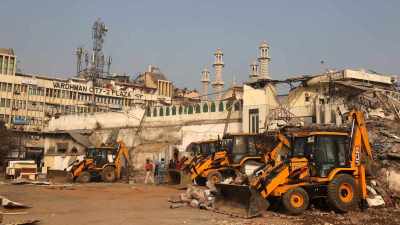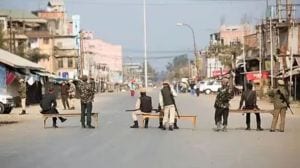Exclusive inclusions
OBC quotas will work if the quality of primary education is improved

Condoleezza Rice, the US secretary of state, has said that slavery was the birthmark of her country which scarred it for ever. India8217;s birthmark is untouchability plus the oppression of other ritually backward jatis. Hindu society is unique in as much as, even in theory, there is no belief in the equality of human beings. Practice is much worse.
Yet the founding fathers they were mostly men of the Indian Constitution pledged universal adult franchise and an egalitarian Directive Principles to overcome this defect. The founders were imbued with liberal, even social democratic, impulses which aspire to equality of all human beings. They, especially Pandit Nehru, believed that with economic progress such equality would be established. In the meantime, the status of Scheduled Castes and Tribes was maintained for special concessions.
But in the first 30 years economic progress was slow and much of the fruit went to the upper caste/upper class members who could command the better paid public sector jobs. The lower castes and even the Dalits and tribals were left out of the bonanza and they began to lose faith in the benevolence of the Congress dispensation. The Emergency was a reflection of the tensions the government could not deal with democratically.
So, immediately after Indira Gandhi8217;s defeat, we had the Mandal Commission. But the Congress was still in denial about the need to implement any inclusive strategy. But when the Congress lost in 1989, V.P. Singh took the Mandal report off the shelf and implemented it. This codified in great detail the relatively worse off using the jati classification. What it asserted, however, is a basic contradiction between the liberal/social democratic premise of the Constitution and the social reality of India, or at least Hindu society.
The Mandal premise is that, in order to establish some equality between the life chances of different individuals, the weaker have to have special help. So far so good, and in line with the principles of affirmative action. The problem arises because, in order to achieve equality, labels of ritual backwardness have to be deployed as passports to claims to special treatment. It is different being black in America, since that is an ineradicable personal characteristic. But low jati status is not physically visible; it is a socially imposed burden. It should be something people should be happy to lose.
Indian democratic politics has, however, used the Mandal labels in a very different way. It has encouraged more and more groups to get into a race of being More OBC than Thou. No political party has any incentive in arguing that jati status is not a foolproof indicator of social and economic backwardness. There are, as Mayawati has discovered, poor Brahmins and rich OBCs. This is because economic development over the last hundred years has allowed opportunities for some individuals in ritually backward jatis and indeed for some jatis themselves to move up the social and economic ladder. Untouchable, his father8217;s excellent autobiography edited by Narendra Jadhav, the present vice chancellor of Pune University, shows how a Dalit family, with a widowed mother with small children, raised themselves by their own efforts after moving to Bombay by taking every and any opportunity which was there. No special favours were shown or asked for and the grandchildren of the widowed mother are now all Class I officers or better.
Stories of jati mobility also abound. Look at the Patidar community in Gujarat which was treated as not much better than Dalits in the early decades of the last century and is now one of the most powerful in Gujarat. Each state in India furnishes such examples.
Mandal and democratic compulsions invite us to abandon this path. No matter how prosperous a backward jati will become, it will keep the label and it will be in the interest of every jati to hang on to the backward label since it is a passport to public favours. The recent agitation by Gujjars has shown that the stakes for being labelled as backward are very high, and in a democratic culture there will be competitive populism to accord such status to whoever promises the vote bank to a party.
But the die is now cast. Parliament legislated reservations and now the Supreme Court has validated the legislation. There are caveats about the creamy layer but I predict that Lok Sabha will not be in a hurry to implement the Supreme Court8217;s injunctions about extending the definition of creamy layer to themselves and ex-MPs. I wish that were a precondition before reservations could be implemented.
My hope is that the decision will achieve the good it wishes to. My expectation is that it will not. This is because the real problem of social deprivation for the SCs, STs, OBCs is in primary schools and secondary schools where the foundations of failure are laid and no political party, whatever its rhetoric, is grasping that nettle. Every one is for reserving seats at the top of the pyramid and joining the creamy layer of IITs and IIMs. But between the top layer of rich upper castes and the creamy layers of the beneficiaries of reservations, there is a large slice of India. They cannot escape Indian higher education by going abroad as the rich can, nor can they get into the top institutions by merit. As of now no political party wishes to champion them but they constitute a fertile ground of the disaffected whose bitterness will be harvested by some party sooner or later.
But Mandal is all about Hindu caste society. The deprived who are non-Hindu 8212; Christians, Muslims, Buddhists 8212; have no reservation cover which has the legitimacy of a Supreme Court decision in their favour. As the Muslim case shows, their reservations will be political football across the secular/communal divide. They are too few and too exposed as 8220;foreign8221; to agitate and too many to be left by the roadside. But then that is the irony of a secular polity using democratic pressures to protect the deprived groups within the religious majority but not the majorities of minority religions.
The writer is a member of the British House of Lords
M.Desailse.ac.uk
- 01
- 02
- 03
- 04
- 05






























